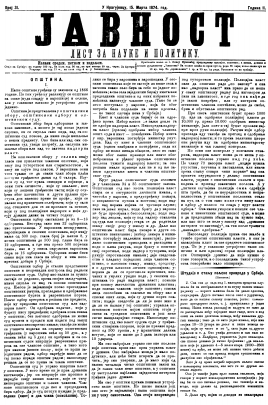
ЈАВНОСТ - лист за наукe и политику (1874/31)
ОПШТИНА; Штудије о стању пољске привреде у Србији; Земљеделско-шумарска школа у Пожаревцу; ДОПИСИ; ОГЛАСИ; НАШИМ ЧИТАОЦИМА; На знање; Књижевни Оглас;
More...We kindly inform you that, as long as the subject affiliation of our 300.000+ articles is in progress, you might get unsufficient or no results on your third level or second level search. In this case, please broaden your search criteria.

ОПШТИНА; Штудије о стању пољске привреде у Србији; Земљеделско-шумарска школа у Пожаревцу; ДОПИСИ; ОГЛАСИ; НАШИМ ЧИТАОЦИМА; На знање; Књижевни Оглас;
More...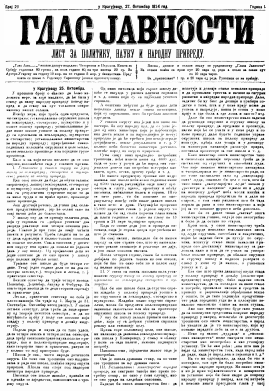
Нов швајцарски устав; Уредништву ''Гласа Јавкости''; ОПШТИНА; ИЗ НАРОДА; ИЗ СРЕЗА АЕПЕНИЧКОГ; Одзив на чланак у 18-ом бр. ''Гл.Јавности“, Каква нам је летина?; Политички преглед; КРАГУЈЕВАЧКЕ ВЕСТИ; НАЈНОВИЈЕ;
More...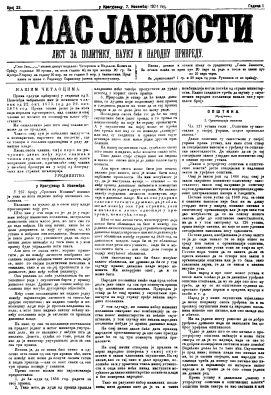
НАШИМ ЧИТАОЦИМА; ОПШТИНА; Нов швајцарски устав; ЈАВНА ЛАЖ; ИЗ НАРОДА; Како стоимо с летином? Са Тимока; Политички прегдед; ОГЛАСИ; ОБЈАВА; ЧИТАЈ; ОБЈАВА; ОБЈАВА!;
More...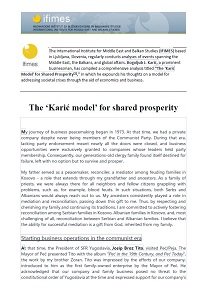
My journey of business peacemaking began in 1973. At that time, we had a private company despite never being members of the Communist Party. During that era, lacking party endorsement meant nearly all the doors were closed, and business opportunities were exclusively granted to companies whose leaders held party membership. Consequently, our generations-old clergy family found itself destined for failure, left with no option but to survive and prosper. My father served as a peacemaker, reconciler, a mediator among feuding families in Kosovo - a role that extends through my grandfather and ancestors. As a family of priests, we were always there for all neighbors and fellow citizens grappling with problems, such as, for example, blood feuds. In such situations, both Serbs and Albanians would always reach out to us. My ancestors consistently played a role in mediation and reconciliation, passing down this gift to me. Thus, by respecting and cherishing my family and continuing its traditions, I am committed to actively fostering reconciliation among Serbian families in Kosovo, Albanian families in Kosovo, and, most challenging of all, reconciliation between Serbian and Albanian families. I believe that the ability for successful mediation is a gift from God, inherited from my family.
More...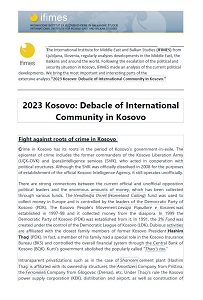
Crime in Kosovo has its roots in the period of Kosovo’s government-in-exile. The epicenter of crime includes the former commanders of the Kosovo Liberation Army (UÇK-OVK) and (para)intelligence services (ShIK), who acted in cooperation with political structures. Although the ShIK was officially dissolved in 2008 for the purposes of establishment of the official Kosovo Intelligence Agency, it still operates unofficially. There are strong connections between the current official and unofficial opposition political leaders and the enormous amounts of money, which has been collected through various funds. The Vendlindja thrret (Homeland Calling) fund was used to collect money in Europe and is controlled by the leaders of the Democratic Party of Kosovo (PDK). The Kosovo People’s Movement Levizja Popullore e Kosoves was established in 1997-98 and it collected money from the diaspora. In 1999 the Democratic Party of Kosovo (PDK) was established from it. In 1991, the 3% Fund was created under the control of the Democratic League of Kosovo (LDK). Dubious activities are affiliated with the closest family members of former Kosovo President Hashim Thaçi (PDK). In fact, a member of his family had a special role in the Kosovo Insurance Bureau (BKS) and controlled the overall financial system through the Central Bank of Kosovo (BQK). Kurti’s government abolished the popularly called “Thaci’s tax.”
More...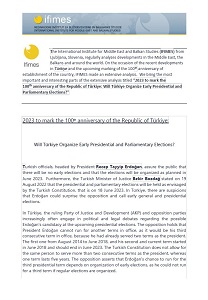
Turkish officials, headed by President Recep Tayyip Erdoğan, assure the public that there will be no early elections and that the elections will be organized as planned in June 2023. Furthermore, the Turkish Minister of Justice Bekir Bozdağ stated on 19 August 2022 that the presidential and parliamentary elections will be held as envisaged by the Turkish Constitution, that is on 18 June 2023. In Türkiye, there are suspicions that Erdoğan could surprise the opposition and call early general and presidential elections.
More...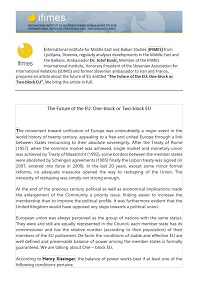
The movement toward unification of Europe was undoubtedly a major event in the world history of twenty century, appealing to a free and united Europe through a link between States renouncing to their absolute sovereignty. After the Treaty of Rome (1957), when the common market was achieved, single market and monetary union was achieved by Treaty of Maastricht (1992), some borders between the member states were abolished by Schengen agreements (1985) finally the Lisbon treaty was signed (in 2007, entered into force in 2009). In the last 20 years, except some minor formal reforms, no adequate measures opened the way to reshaping of the Union. The necessity of reshaping was simply not strong enough.
More...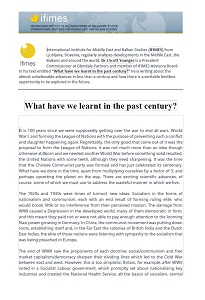
It is 100 years since we were supposedly getting over the war to end all wars, World War I, and forming the League of Nations with the purpose of preventing such a conflict and slaughter happening again. Regrettably, the only good that came out of it was the proposal to form the League of Nations; it was not much more than an idea though otherwise stillborn and we needed another World War before something solid resulted, the United Nations with some teeth, although they need sharpening. It was the time that the Chinese Communist party was formed and has just celebrated its centenary. What have we done in the time, apart from multiplying ourselves by a factor of 3, and perhaps upsetting the planet on the way. There are exciting scientific advances, of course, some of which we must use to address the wasteful manner in which we live.
More...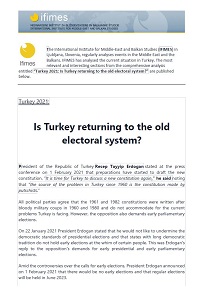
President of the Republic of Turkey Recep Tayyip Erdogan stated at the press conference on 1 February 2021 that preparations have started to draft the new constitution. “It is time for Turkey to discuss a new constitution again,” he said noting that “the source of the problem in Turkey since 1960 is the constitution made by putschists.” All political parties agree that the 1961 and 1982 constitutions were written after bloody military coups in 1960 and 1980 and do not accommodate for the current problems Turkey is facing. However, the opposition also demands early parliamentary elections.
More...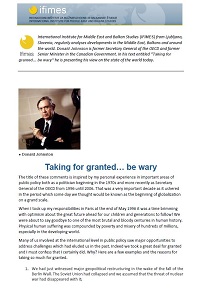
The title of these comments is inspired by my personal experience in important areas of public policy both as a politician beginning in the 1970s and more recently as Secretary General of the OECD from 1996 until 2006. That was a very important decade as it ushered in the period which some day we thought would be known as the beginning of globalization on a grand scale. When I took up my responsibilities in Paris at the end of May 1996 it was a time brimming with optimism about the great future ahead for our children and generations to follow! We were about to say goodbye to one of the most brutal and bloody centuries in human history. Physical human suffering was compounded by poverty and misery of hundreds of millions, especially in the developing world.
More...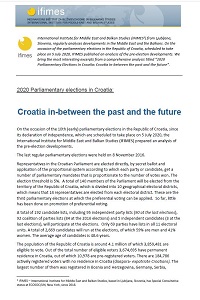
On the occasion of the 10th (early) parliamentary elections in the Republic of Croatia, since its declaration of independence, which are scheduled to take place on 5 July 2020, the International Institute for Middle East and Balkan Studies (IFIMES) prepared an analysis of the pre-election developments. The last regular parliamentary elections were held on 8 November 2016. Representatives in the Croatian Parliament are elected directly, by secret ballot and application of the proportional system according to which each party or candidate, get a number of parliamentary mandates that is proportionate to the number of votes won. The election threshold is 5%. A total of 140 members of the Parliament will be elected from the territory of the Republic of Croatia, which is divided into 10 geographical electoral districts, which means that 14 representatives are elected from each electoral district. These are the third parliamentary elections at which the preferential voting can be applied. So far, little has been done on promotion of preferential voting.
More...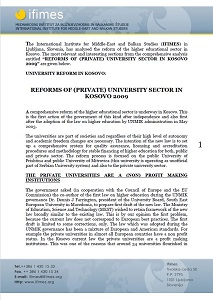
A comprehensive reform of the higher educational sector is underway in Kosovo. This is the first action of the government of this kind after independence and also first after the adoption of the law on higher education by UNMIK administration in May 2003. The universities are part of societies and regardless of their high level of autonomy and academic freedom changes are necessary. The intention of the new law is to set up a comprehensive system for quality assurance, licensing and accreditation procedures and methodology for stable financing of higher education for both, public and private sector. The reform process is focused on the public University of Prishtina and public University of Mitrovica (this university is operating as unofficial part of Serbian University system) and also to the private university sector.
More...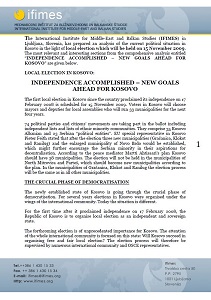
The first local election in Kosovo since the country proclaimed its independence on 17 February 2008 is scheduled for 15 November 2009. Voters in Kosovo will choose mayors and deputies for local assemblies who will run 33 municipalities for the next four years. 74 political parties and citizens’ movements are taking part in the ballot including independent lists and lists of ethnic minority communities. They comprise 35 Kosovo Albanian and 23 Serbian “political entities”. EU special representative in Kosovo Pieter Feith stated that after the election three new municipalities (Gračanica, Klokot and Ranilug) and the enlarged municipality of Novo Brdo would be established, which might further encourage the Serbian minority in their aspirations for decentralisation. According to the peace mediator Martti Ahtisaari’s plan Kosovo should have 38 municipalities. The election will not be held in the municipalities of North Mitrovica and Parteš, which should become new municipalities according to the plan. In the municipalities of Gračanica, Klokot and Ranilug the election process will be the same as in all other municipalities.
More...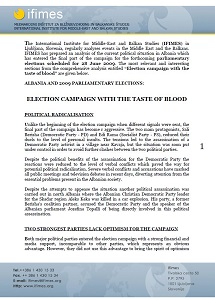
Unlike the beginning of the election campaign when different signals were sent, the final part of the campaign has become r aggressive. The two main protagonists, Sali Berisha (Democratic Party - PD) and Edi Rama (Socialist Party - PS), reduced their duels to the level of personal insults. The tensions led to the assassination of a Democratic Party activist in a village near Kavaja, but the situation was soon put under control in order to avoid further clashes between the two political parties. Despite the political benefits of the assassination for the Democratic Party the reactions were reduced to the level of verbal conflicts which paved the way for potential political radicalisation. Severe verbal conflicts and accusations have marked all public meetings and television debates in recent days, diverting attention from the essential problems present in the Albanian society.
More...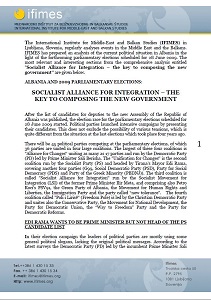
After the list of candidates for deputies to the new Assembly of the Republic of Albania was published, the election race for the parliamentary elections scheduled for 28 June 2009 started. Political parties launched intensive campaigns by presenting their candidates. This does not exclude the possibility of various tensions, which is quite different from the situation at the last elections which took place four years ago. There will be 45 political parties competing at the parliamentary elections, of which 36 parties are united in four large coalitions. The largest of these four coalitions is ”Alliance for Changes‟ uniting as many as 17 parties and run by the Democratic Party (PD) led by Prime Minister Sali Berisha. The ”Unification for Changes‟ is the second coalition run by the Socialist Party (PS) and headed by Tirana’s Mayor Edi Rama, covering another four parties (G99, Social Democratic Party (PSD), Party for Social Democracy (PDS) and Party of the Greek Minority (PBDNJ)). The third coalition is called ”Socialist Alliance for Integration‟ run by the Socialist Movement for Integration (LSI) of the former Prime Minister Ilir Meta, and comprising also Petro Koci’s PSV91, the Green Party of Albania, the Movement for Human Rights and Liberties, the Immigration Party and the party called “new tolerance”. The fourth coalition called ”Poli i Lirisë‟ (Freedom Pole) is led by the Christian Democratic Party and unites also the Conservative Party, the Movement for National Development, the Party for Democratic Union, the “Way to Freedom” Party and the Party for Democratic Reforms.
More...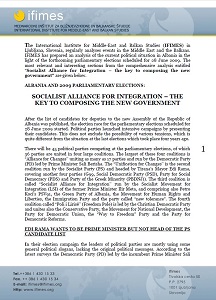
After the list of candidates for deputies to the new Assembly of the Republic of Albania was published, the election race for the parliamentary elections scheduled for 28 June 2009 started. Political parties launched intensive campaigns by presenting their candidates. This does not exclude the possibility of various tensions, which is quite different from the situation at the last elections which took place four years ago. There will be 45 political parties competing at the parliamentary elections, of which 36 parties are united in four large coalitions. The largest of these four coalitions is “Alliance for Changes” uniting as many as 17 parties and run by the Democratic Party (PD) led by Prime Minister Sali Berisha. The “Unification for Changes” is the second coalition run by the Socialist Party (PS) and headed by Tirana’s Mayor Edi Rama, covering another four parties (G99, Social Democratic Party (PSD), Party for Social Democracy (PDS) and Party of the Greek Minority (PBDNJ)). The third coalition is called “Socialist Alliance for Integration” run by the Socialist Movement for Integration (LSI) of the former Prime Minister Ilir Meta, and comprising also Petro Koci’s PSV91, the Green Party of Albania, the Movement for Human Rights and Liberties, the Immigration Party and the party called “new tolerance”. The fourth coalition called “Poli i Lirisë” (Freedom Pole) is led by the Christian Democratic Party and unites also the Conservative Party, the Movement for National Development, the Party for Democratic Union, the “Way to Freedom” Party and the Party for Democratic Reforms.
More...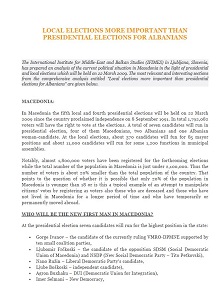
In Macedonia the fifth local and fourth presidential elections will be held on 22 March 2009 since the country proclaimed independence on 8 September 1991. In total 1,792,082 voters will have the right to vote at the elections. A total of seven candidates will run in presidential election, four of them Macedonians, two Albanians and one Albanian woman-candidate. At the local elections, about 370 candidates will fun for 85 mayor positions and about 11,000 candidates will run for some 1,200 functions in municipal assemblies.
More...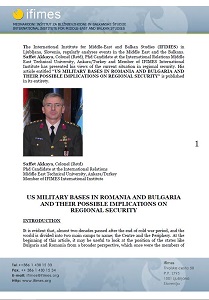
It is evident that, almost two decades passed after the end of cold war period, and the world is divided into two main camps to name; the Centre and the Periphery. At the beginning of this article, it may be useful to look at the position of the states like Bulgaria and Romania from a broader perspective, which once were the members of the periphery in the Communist Block. Throughout the new reformation and restructuring phases of the global age, new world order has dictated certain unnamed rules that are vital for the future of global order and mankind. Current world order is completely different and the political, geographical or cultural principles of the cold-war era to classify the states into different groups are not relevant anymore. Description of south, north, west, second world, and third world has changed dramatically. Centre is composed of economically and militarily strong states, basically the representatives of hegemonic liberalism, no matter at which geographic location they occupy on the planet. On the other hand, Periphery is made by the states who were once the members of Second (communist block) or Third Worlds and some other states that are excluded from the centre for cultural, religious or ideological reasons. Now, there is a struggle among the peripheral states, trying to be a member of centre at all costs. The expansion of NATO and EU towards east to the expense of old Soviet territories in general and Russia in particular, need to be evaluated through the principles of a broader security perception.
More...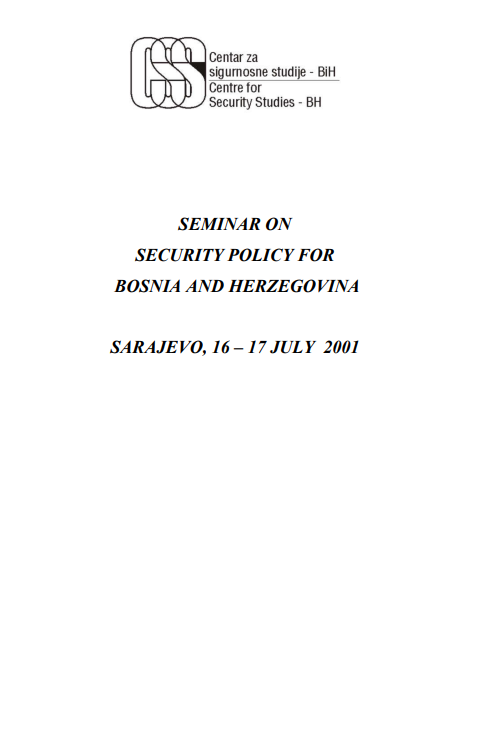
Significant progress has been achieved since the signing the Dayton Peace Agreement. Today, peace and stability prevail throughout Bosnia-Herzegovina; co-operation between Bosnia’s three constituent communities - Bosniacs, Croats and Serbs - has been increasing; Bosnia’s war-damaged infrastructure has to a large extent been repaired; many of Bosnia’s refugees have returned to the homes they had occupied prior to the war, and; the country’s economy has been steadily returning back on course. Much, however, remains to be done in Bosnia and Herzegovina in order to secure a peaceful and stable future for the country. One of the most pressing tasks that stand ahead is the establishment of a state security policy for the country.
More...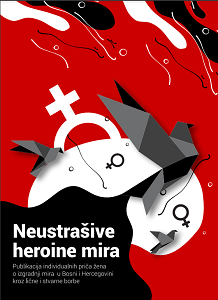
Sada kada Bosna i Hercegovina ulazi u treću deceniju od završetka ratnog sukoba, određene problematike iz društvene sfere koje se nisu pravilno adresirale u postkonfliktnom periodu ostavljaju traga i na feminističke aspekte razvoja društva, posebno u sferi tranzicijske pravde. S druge strane, sa različitim geopolitičkim dešavanjima širom Evrope i svijeta, Bosna i Hercegovina se našla u poziciji u kojoj konflikti iz drugih zemalja ostavljaju trag na naše društvo – da li kroz učešće sigurnosnih snaga iz BiH u mirovnim misijama ili kroz primanje izbjeglica, migranata i migrantica i tražitelja i tražiteljica azila iz konfliktnih i drugih zemalja svijeta.
More...